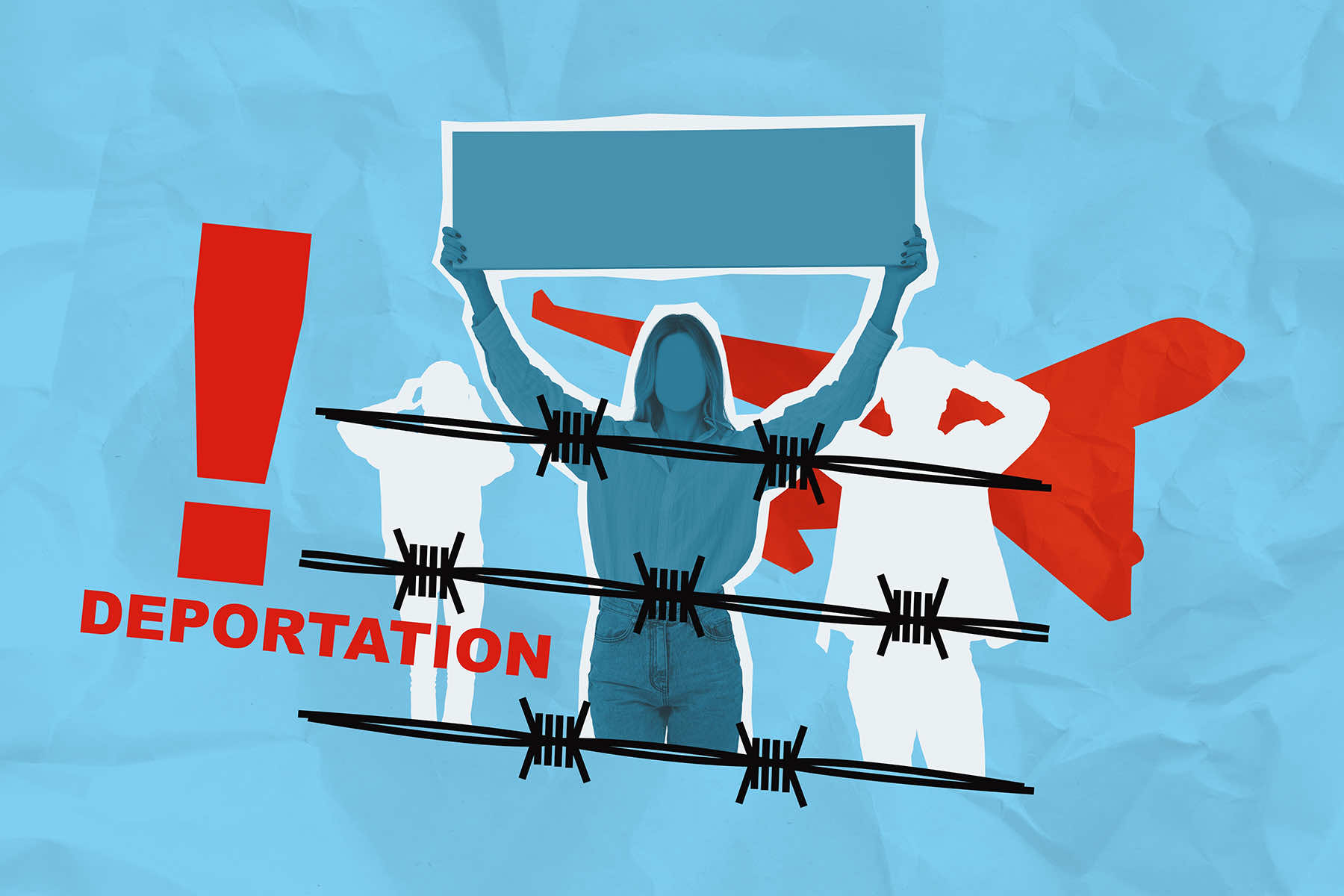
As the Trump regime intensifies federal immigration enforcement during its second term, new data reveals how Wisconsin’s county sheriffs are playing a central role in funneling immigrants from local jails into the hands of federal deportation officers.
A July 2025 report by the ACLU of Wisconsin outlines how 13 law enforcement agencies in the state have formalized cooperation with U.S. Immigration and Customs Enforcement (ICE) through active 287(g) agreements.
The Jail-to-Deportation Pipeline in Wisconsin report documented the partnerships that allowed local officers to act on ICE’s behalf, interrogating individuals about their immigration status, issuing detainers, and even initiating deportation proceedings from within county jails.
The expansion of the 287(g) program marks a sharp increase from 2022, when only eight Wisconsin sheriffs were participating. According to ICE, all of the program’s growth in the state occurred during 2025, with new agreements signed in counties including Kewaunee, Outagamie, Washington, Waupaca, Winnebago, and Wood.
These arrangements allow ICE to embed itself within local jurisdictions, often circumventing community-driven efforts to curtail immigration enforcement, and place immigrant residents at heightened risk of detention and removal.
Waukesha County remains the only jurisdiction in Wisconsin operating under the Jail Enforcement Model, which permits broader authority to conduct immigration enforcement from inside jail facilities. Other counties use the Warrant Service Officer (WSO) model, which permits deputies to serve ICE-issued warrants and detain immigrants without judicial oversight.
While advocates have long criticized the 287(g) program for eroding trust between police and immigrant communities, the ACLU’s updated report indicates that cooperation with ICE has become more embedded and financially incentivized than previously understood.
From 2021 through 2024, the Wisconsin Department of Corrections and 29 counties received over $7.25 million through the State Criminal Alien Assistance Program (SCAAP). This federal grant reimburses local governments for the cost of incarcerating undocumented individuals, but requires detailed data-sharing with ICE in return.
The resulting database helps ICE track, locate, and target individuals for detention and deportation. Counties that received substantial SCAAP funds include Brown, Dane, Fond du Lac, Kenosha, Marathon, Racine, Sheboygan, Walworth, and Waukesha.
The largest single recipient was the Wisconsin Department of Corrections, which received over $4.6 million during the four-year period. While some counties, such as Dane, have since ended their participation, the overall trend shows continuing and widespread collaboration.
In addition to 287(g) agreements and SCAAP grants, ICE relies heavily on detainers, requests that local jails hold individuals for up to 48 hours beyond their scheduled release. These detainers are not accompanied by judge-signed warrants, and Wisconsin state law provides no authority to honor them.
Nevertheless, the ACLU report shows that from October 2021 to June 2025, ICE issued over 3,300 detainers to Wisconsin jails.
The breakdown shows a rising trend: 474 detainers were sent in FY 2022, increasing to 853 in FY 2023, 942 in calendar year 2024, and 1,065 in just the first six months of 2025.
In counties like Milwaukee and Dane, policies have been implemented to limit compliance with these detainers, citing legal and constitutional concerns. But many other counties continue to honor them, often based on templated policies written by third-party vendors like Lexipol.
According to a 2025 survey, some sheriffs explicitly confirmed they do not require judicial warrants to comply with ICE requests, highlighting the lack of uniformity and potential for wrongful detention.
Beyond informal or data-driven cooperation, some counties have entered into direct financial contracts with ICE to house and transport detainees.
Brown County modified its existing ICE agreement in April 2025 to expand funding for both detention and transportation services, billing $70 per detainee per day and $36 per hour for transportation. The county expects to receive at least $90,000 in compensation under the new terms.
Sauk County, through a modification to its Intergovernmental Agreement, now receives a per-diem rate of $106 per detainee held for ICE and bills $38.45 per hour for guard and transportation services.
In a six-week period between May and June 2025, the county billed ICE for 45 days of detention, totaling $4,770. The billing documentation explicitly listed “Immigration and Customs Enforcement” as the reason for the detentions.
Similarly, Ozaukee County has allowed ICE to purchase jail space through an expansion of its existing agreement with the U.S. Marshals Service.
These formalized financial arrangements mark a shift from passive cooperation to active partnership. Rather than merely honoring ICE detainers or submitting data through SCAAP applications, local sheriffs are now contracting with ICE to serve as paid extensions of the federal deportation system.
Civil liberties advocates warn that such arrangements deepen the entanglement between local law enforcement and federal immigration policy, raising constitutional questions and threatening public trust.
“In essence, AB-24 represents a significant step towards codifying and expanding the harmful practices that fuel the jail-to-deportation pipeline, transforming local sheriffs into tools of mass deportation and undermining the safety and well-being of Wisconsin communities.” – ACLU Report, July 2025
The legal basis for many of these practices remains in dispute. Detainers issued by ICE are administrative, not judicial, and courts have ruled that complying with them may violate the Fourth Amendment. Nonetheless, some sheriffs continue to honor them on the basis of internal policies or directives from ICE.
The growing infrastructure of sheriff-ICE cooperation is also being reinforced at the legislative level. A pair of bills introduced during the 2025–2026 legislative session, Assembly Bill 24 and its companion Senate Bill 57, aim to mandate and codify much of the ICE collaboration already taking place informally or through contract.
AB-24, as amended, would require sheriffs to investigate the citizenship status of any individual jailed for an offense punishable as a felony, regardless of whether charges have been filed or a conviction has occurred. Under the bill, if a person cannot provide documentation of lawful U.S. presence or chooses to remain silent, the sheriff must report them to the Department of Homeland Security.
The bill specifies which documents are considered proof of legal presence and gives local officers broad authority to initiate immigration enforcement actions based solely on the absence of these papers. Critics warn that this would force all individuals, including U.S. citizens, to carry immigration documentation and expose themselves to inquiry by law enforcement under the threat of detention or referral to ICE.
In addition to status investigations, AB-24 would also compel sheriffs to honor ICE detainers accompanied by administrative warrants, documents signed by ICE agents rather than legal court documents approved by judges. Although these civil detainers do not have the legal force of criminal warrants under Wisconsin law, the bill would override that limitation by mandating compliance.
In its report, the ACLU of Wisconsin said it strongly opposed the legislation, citing a range of constitutional, legal, and ethical concerns. Chief among them is the erosion of community trust in law enforcement, especially in immigrant communities already fearful of engagement with police.
By turning sheriffs into immigration agents, the ACLU argued, victims and witnesses will become less likely to report crimes or cooperate with investigations.
The bill also raises the specter of racial profiling. Officers lacking formal immigration training would be placed in the position of making complex determinations about who “appears” to be undocumented. Such discretion, the ACLU warned, increases the risk of wrongful arrest, prolonged detention, and violations of due process rights.
AB-24 contains punitive measures as well. If a county sheriff fails to certify compliance with the bill’s provisions, the Wisconsin Department of Revenue would reduce that county’s shared revenue payments by 15 percent for the following year. This built-in penalty places financial pressure on counties to comply with ICE, even in cases where local values, public safety considerations, or constitutional concerns argue against it.
The ACLU noted that this fiscal punishment could have cascading effects, forcing county governments to cut services, lay off workers, or divert resources away from core public functions simply to maintain compliance with federal immigration enforcement.
Despite pushback from immigrant rights groups, civil liberties advocates, and legal scholars, the legislative momentum for AB-24 underscores a broader national trend toward deputizing local law enforcement in service of draconian federal immigration priorities.
In Wisconsin, this trend is already well underway. As of mid-2025, ICE has built a robust and multifaceted infrastructure in the state that includes deputized local officers, real-time data pipelines, contracts for jail beds and transport, and formal agreements with more than a dozen sheriff’s departments.
While some counties have stepped back from this collaboration – Dane County, for instance, formally withdrew from the SCAAP program in January 2025 – the overwhelming trajectory points toward greater entanglement and institutionalization of the jail-to-deportation pipeline.
The ACLU report concluded with a call to action, encouraging Wisconsinites to engage with their local sheriffs, demand policy transparency, and oppose legislative proposals like AB-24. It also urged residents to support immigrant advocacy organizations and participate in public hearings and forums where local law enforcement and ICE cooperation are under discussion.
Wisconsin Residents were also advised to ask specific questions of law enforcement, such as whether the sheriff’s department honors ICE detainers without a judge’s signature, whether immigration status is questioned during traffic stops or arrests, and whether the department has any current contracts or agreements with ICE.
In the absence of judicial oversight or consistent statewide policy, the burden of oversight now falls heavily on the public. As the report makes clear, the consequences of inaction are already visible. It is seen in the growing number of individuals in Wisconsin who are being detained and deported based on minor infractions or civil violations, often without having committed any criminal offense.
Without meaningful intervention, local cooperation with ICE will continue to deepen. The ACLU report documents how sheriff contracts, legislative mandates, and financial incentives are aligning to expand detention and deportation across Wisconsin. And all of these actions are beyond the scrutiny of courts, communities, or elected oversight.
© Art
ImageFlow (via Shutterstock)















